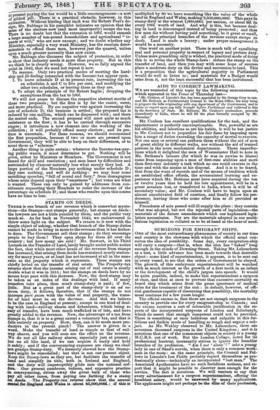STAMPS ON DEEDS.
THERE is one branch of our revenue which is somewhat myste- rious—the Stamps—not stamps generally, but stamps on deeds : the lawyers are not a little puzzled by them, and the public very much so. As far back as November 1845, we endeavoured to throw some light on the subject. We return to it now with the simple object of asking, whether that branch of the Stamp-duties cannot be made to bring in more to the revenue than it has hither- to done. The Government sell their stamps ; do they encourage people to buy them? They open shops for them all over the country ; but how many are sold ? Mr. Stewart, in his Third Lecture on the Transfer of Land, lately brought under public notice the fact, that while most other heads of the revenue from stamps has increased, that arising from deeds has remained nearly station. ary for many years, or at least has not increased at all in the same ratio as the property which it represents. These stamps are chiefly levied on the transfer of real estate. The Property-tax returns show that the income arising out of real estate is nearly double what it was in 1815 ; but the stamps on deeds have by no means kept pace with this increase. Now, the deed-stamp may be taken as an index of the dealings with land. If many transfers take place, then much stamp-duty is paid ; if few, little. But as a great part of the stamp-duty is an ad va- lorem duty, it follows, therefore, that if the stamps do not increase pari passu with the value of real property, the trans- fer of land must be on the decrease. And this we believe to be the case in England at present ; except in one kind of deal- ing with land—railway shares and debentures, which being so easy of transfer, have been much trafficked in of late, and have greatly added to the revenue. Now, the advantage of a tax from stamps is, that it is to a great extent a voluntary tax, and that it falls entirely on property. How, then, can it be made more pro- ductive in the present pinch? The answer is given in a word. Make the transfer of land as simple as that of rail- way shares, and you will soon see the effect on the revenue. We do not all like railway shares, especially just at present ; but we all like land, if we can acquire it easily ,and hold it safely; and if the conveyancing expenses are cheap we shall not grudge Stamp-duty. We formerly showed how the Stamp- laws might be remodelled; but that is not our present object. Keep the Stamp-laws as they are, but facilitate the transfer of land and simplify its title, both in Ireland and England, and the duty will imperceptibly glide into the national cof- fers. Our present cumbrous, tedious, and expensive practice in conveyancing, drives away the great bulk of those who Pay .all other taxes, from paying one farthing for a stamp on deeds. The Property-tax returns show that the annual /coital for England and Wales is about 85,000,00k.: if this is multiplied by 30 we have something like the value of the whole land in England and Wales, making 2,550,000,0001. This pays in stamp-duty at the utmost 1,000,0001. per annum, or about 9d. in every 1001. worth of land. And why is this, but because deal- ing in land is discouraged instead of being promoted ; and thus few men die without having paid something, be it great or small, to all other principal branches of the revenue except stamps on deeds. Land is made a luxury ; under proper management it would be a necessity.
One word on another point. There is much talk of equalizing real and personal property in respect of legacy and probate duty. Unless mere grumbling only is wished, the practical mode of doing this is to revise the whole Stamp-laws : reduce the stamp on the transfer of land, and then you may with some hope of success place a moderate duty on the devise and succession to land. This is a proposition that the agricultural majority in Parliament would do well to listen to ; and materials for a Budget would arise from it, not the least successful that has been introduced.


























 Previous page
Previous page